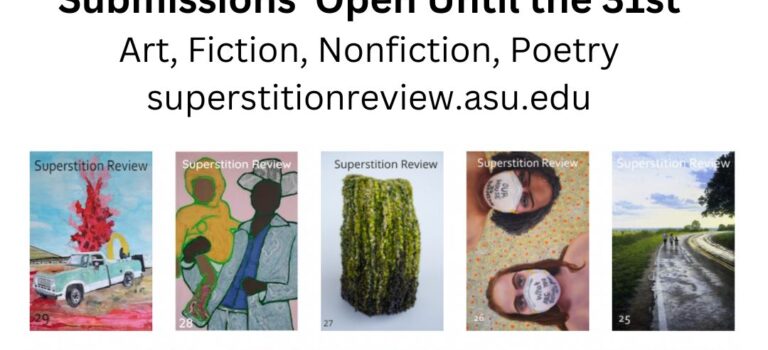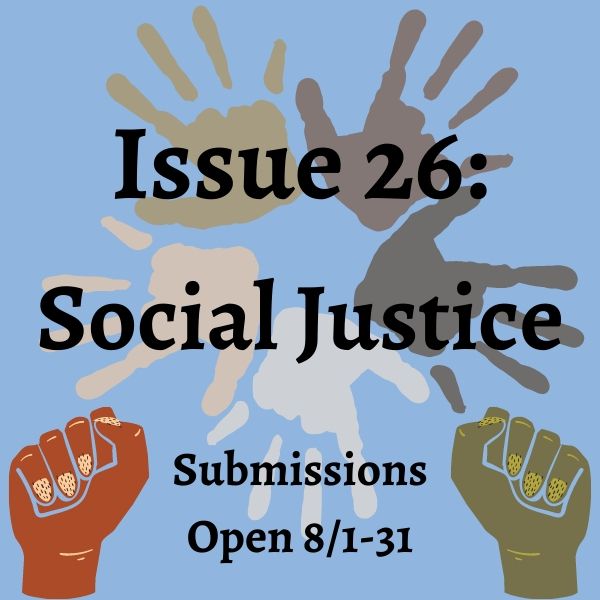Superstition Review is open to submissions for Issue 31! Our submission window closes January 31st, 2023.
Our magazine is looking for art, fiction, nonfiction, and poetry. Read our guidelines and submit here.

The Online Literary Magazine at Arizona State University

Superstition Review is open to submissions for Issue 31! Our submission window closes January 31st, 2023.
Our magazine is looking for art, fiction, nonfiction, and poetry. Read our guidelines and submit here.

Superstition Review is currently accepting submissions of art, poetry, fiction, and non-fiction through August 31st. Submissions are free of charge on our Submittable page: https://superstitionreview.submittable.com/submit
We are proud to announce that the theme of Issue 26, our inaugural themed issue, is Social Justice. On behalf of Arizona State University and the College of Integrative Sciences and Arts, we have chosen to dedicate this issue to work that promotes inclusion and explores new ways to dismantle racial and social inequality. We believe in the importance of magnifying voices that have been traditionally undermined by our histories, institutions, policies, laws, and habits of daily life.
We hear you and are here for you on your journey to inspire change through art.
Social Justice is defined by the Oxford English Dictionary as “Justice in terms of the distribution of wealth, opportunities, and privileges within a society.” It is a movement for change to improve the lives of individuals who are not treated fairly or justly in our society. It is a choice to stand as a community in support of what we believe in.
We believe that everyone deserves an equal chance, regardless of their race, gender, sexuality, religion and any other part of who they are.
To read more about our commitment to structural change, read our college’s Response to Structural Racism and Violence.
I have learned, through two short years of examining literature, that there are so many different stories out there and those stories are told in so many more different ways. There are even more definitions in the world on “what a story is.” As much as I would like to rattle off which definition is more right than another, I simply can’t. A story is whatever we make it. It can be shared or it can be kept for oneself. But if a story is shared, it communicates something to the readers. As Gertrude Stein says, “If the communication is perfect, the words have life, and that is all there is to good writing, putting down on the paper words which dance and weep and make love and fight and kiss and perform miracles.”
When I read fiction, I look for the raw and the real. Stories that go deeper than the stereotypes and examine life on a constructive level are the ones I remember, connect with, and share. Within the stories themselves, I want to be able to relate to the characters. I want to see what they see, hear what they hear, feel what they feel. Stories that are character driven, surrounded by sensory details and imagery, evoke emotion enough in me to keep me reading until the very end. When a writer shares something that displays the human condition in a way that makes tears form in the corner of my eyes (whether from laughter, anger, sadness, or a mixture of all three), I know that I will remember that story above all others. Combinations of words and ideas have power enough to execute a story that does “dance and weep and make love and fight…” and I look for that in the stories I read.
As a writer myself, I am inspired by every submission. The courage authors have to share their work with the world is something I admire, as mundane and every day as that may sound. Each submission leaves a lasting impression that I learn from and go back to whenever I need. This constant communication between art and people and people and art is what motivates me to keep reading. Share with me the stories that don’t just push characters over the edge, but stories that push the readers too.

Alexandra Myers is a fiction editor for issue 22 of Superstition Review. She is a senior at Arizona State University majoring in creative writing, with a minor in film. After graduation, she plans to become a volunteer for the Peace Corps and upon return to the states will continue her passion for writing by completing an MFA.
Editorial Preferences in Fiction: H. Rae Monk (Spring 2017)
I remember fondly an Advanced Fiction class, where my peers and I workshopped two previously published short stories. The first piece took up only a few minutes of discussion, because everything about the craft, the content and the emotion was air-tight. The second, with many a swiftly moving editing pen and several hands risen, in need to remark on this or that took much, much longer to finish with. I think the instructor had us do this exercise for multiple reasons, however I remember the experience, because I couldn’t help asking, “Why did so-and-so publish this when it’s so obviously not a fully realized draft?” I think there has to be an honesty contract between editors and those who submit. I won’t push a story for consideration because it’s just “good enough”, but I’ll advocate for stories that I believe in, from the title to the final punctuation mark.
I love short literary fiction because there are no places to hide; unnecessary information is erased, prose are polished, and a truth about genuine human experience and emotion remain. I search for fearless, relatable, fully-formed stories that keep me engaged from the first sentence to the last. I tend to focus on stories with clean, well-paced writing, attention to detail, sentence variation, as well as situations and interactions that subvert my expectations. E. Annie Proulx writes, “I find it satisfying and intellectually stimulating to work with the intensity, brevity, balance and word play of the short story.” I look forward to working with, and helping put the concise beauties of submitting contemporary authors out into the public eye.
Bio: Student Fiction Editor H. Rae Monk is a Wyoming native and an almost graduate of ASU’s Creative Writing program. When she isn’t reading every book that comes under her nose, she enjoys creating short fiction driven by characters that see the world through the lens of their abnormal vocations. She also enjoys strong coffee, bouldering, traveling on a tiny budget with a big backpack and engaging with her local literary community. Her future plans are constantly changing, but she is considering both MFA programs and jobs in publishing.
The Berkeley Fiction Review is a UC Berkeley undergraduate, student-run publication. We look for innovative short fiction that plays with form and content, as well as traditionally constructed stories with fresh voices and original ideas. Ultimately, we seek to contribute to literature’s on-going evolution.
We invite submissions of previously unpublished short stories year round and publish annually. Submissions are free. Contributors whose stories are published receive one free copy of the issue their story appears in. We also host fiction contests and nominate to O. Henry, Best American Short Stories, and Pushcart prizes. Click the link to learn more about the submission guidelines: http://
NEW MADRID: Call for Submissions
“Paradise is an island. So is hell.”
– Judith Schalansky, Atlas of Remote Islands
Winter 2016 Theme: Evolving Islands
We are seeking submissions of original fiction, poetry, and essays on the theme of “Evolving Islands” for our winter 2016 issue. Islands are dynamic geographical entities. They appear and disappear on a regular basis due to volcanic activity and changes in sea level. Their ecosystems are volatile. Some islands are covered in ice or snow. Some are inhabited only by wild horses or pigs. Some islands are artificial. Some are imaginary.
Find more theme details on our website: newmadridjournal.org.
Submission Deadline: October 15, 2015.
For an upcoming issue, Creative Nonfiction is seeking new essays about THE WEATHER. We’re not just making idle chit-chat; the weather affects us all, and talking about the weather is a fundamental human experience. Now, as we confront our changing climate, talking about the weather may be more important than ever.
Send us your true stories—personal, historical, reported—about fog, drought, flooding, tornado-chasing, blizzards, hurricanes, hail the size of golfballs, or whatever’s happening where you are. We’re looking for well-crafted essays that will change the way we see the world around us.
Essays must be vivid and dramatic; they should combine a strong and compelling narrative with an informative or reflective element and reach beyond a strictly personal experience for some universal or deeper meaning. We’re looking for well-written prose, rich with detail and a distinctive voice; all essays must tell true stories and be factually accurate.
A note about fact-checking: Essays accepted for publication in Creative Nonfiction undergo a rigorous fact-checking process. To the extent your essay draws on research and/or reportage (and it should, at least to some degree), CNF editors will ask you to send documentation of your sources and to help with the fact-checking process. We do not require that citations be submitted with essays, but you may find it helpful to keep a file of your essay that includes footnotes and/or a bibliography.
Creative Nonfiction editors will award $1,000 for Best Essay and $500 for runner-up. All essays will be considered for publication in a special “Weather” issue of the magazine.
Guidelines: Essays must be previously unpublished and no longer than 4,000 words. There is a $20 reading fee, or $25 to include a 4-issue subscription to Creative Nonfiction (US addresses only). If you’re already a subscriber, you may use this option to extend your current subscription or give your new subscription as a gift. Multiple entries are welcome ($20/essay) as are entries from outside the United States (though due to shipping costs we cannot offer the subscription deal). All proceeds will go to prize pools and printing costs.
More info: https://www.creativenonfiction.org/submissions/weather
Call for Submissions:
Up to Three Works
Any Style Genre or Form
Somehow Inspired By Work in the Phoenix Art Museum
Deadline: Sunday February 1st
Guidelines and Forms Available Online at: http://fourchamberspress.com/
Four Chambers—what people may or may not know is an independent community literary magazine based in Phoenix, Arizona, also a figurative heart—is looking for local authors to write work in response to exhibitions and collections housed in the Phoenix Art Museum so they can put together a boutique chapbook and stage a live performance in the gallery during Art Detour on First Friday, March 6th (submissions for which close Sunday, February 1st 2015).
Art Loves Literature
Sometimes–in all the hubbub of giving greater visibility to the literary arts and encouraging their larger participation in the cultural scene–people don’t have the opportunity to enjoy art as much as they’d like to. To stop for a moment. Breathe. Smell the roses. The important things in life get missed.
So when things come up and literature doesn’t get to spend as much time with art as it would like to, art can get a little sad.
“I mean, I know literature’s been working really hard to create another space in this city where people can come together, have meaningful interactions and build sustainable forms of community and relationship—we’re all so busy trying to do our own thing—it’s just that, well,” art pauses, looks off into the distance and then down. “We just used to have so much fun together. Literature really understood me.” Art sniffs, quavers, and looks up with sad, shining eyes. “I just miss it.”
What happened? Art and literature made each other so happy. They had such a long history. And now, art is completely heartbroken, literature is lonelier than ever, it has no idea what happened, and it has no idea what to do.
Literature Loves Art
So literature, distraught, called Four Chambers. And after much heartfelt discussion—tears streaming down literature’s face, Four Chambers nodding empathetically on the other line—Four Chambers thinks the best thing literature can do is to ask local authors to go to the Phoenix Art Museum, walk through the galleries, and write something responding to the Museum’s collection of work.
This, the magazine thinks, is the way to win back art’s heart, and will show art that literature cares more than a vintage crockpot from the 1970s or a small yellow cactus in a concrete pot ever could (though both of these would make really great gifts). Then art will understand that literature is truly sorry for whatever it did wrong, people in Phoenix will have a greater sense of cultural cohesiveness and shared identity, and art and literature can continue building the long-lasting relationship they already have.
Four Chambers Loves You
“So all silliness aside,” explains the magazine’s Founder and Editor in Chief Jake Friedman, standing in front of the Art Museum dressed as a baby cupid, “If all we do is help people fall in love with art and / or literature,” adjusting his cloth diaper, shifting the bow and arrow in his hand, “if people can have a slightly more meaningful experience in their life because of this project,” a cold wind causes Friedman to shiver, a wing falling off. “Well…” Friedman shrugs. “That would be a beautiful thing.”
Individuals who are interested in submitting poetry and prose for the Phoenix Art Museum can find more details online at http://fourchamberspress.com/chapbooks/phxart.
Individuals who are interested in visiting the museum may do so for free every Wednesday evening from 3 to 10 pm or every First Friday night from 6 to 10 pm, and any other time, the Museum is open for a modest and reasonable fee. Four Chambers will also be organizing a tour at the Museum Wednesday January 6th at 6:30 pm. Selected works are available online at http://egallery.phxart.org/.
Individuals who want to read Jia’s poem can do so at http://fourchamberspress.com/chapbooks/phxart/joakbaker.
Submissions for the project close Sunday, February 1st, 2015 at 11:59 PM MST.
About Four Chambers Press
Four Chambers Press is an independent community literary magazine based in Phoenix, AZ that wants to expose you to wonderful literature + give you something to do every once in a while + make your life slightly more meaingful. For more information please visit http://fourchamberspress.com.